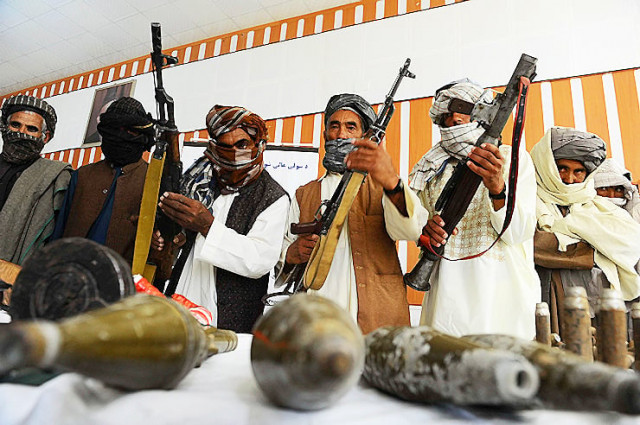Talking to the Taliban
The security complexities are many and our leaders must consider if it is wise to talk to such a force.

File photo of Taliban fighters. PHOTO: AFP/FILE

But it is also clear that the political push for talks is a strong one. The Awami National Party (ANP) chief, Asfandyar Wali, in a switch from his party’s previous stance, has said talks should be held — but that a military operation would be required if they failed. The ANP, which fared even worse than expected at the recent polls, has of course, been hit hard by its previously tougher stance on the Taliban, with scores of leaders and supporters killed in bombings targeting its rallies. The Jamaat-e-Islami’s (JI) line on the matter is more predictable, with party chief Munawar Hasan offering to negotiate between the militants and the government. The Taliban, who have said that they were willing to talk to the government, have suggested the JI or Jamiat Ulema-e-Islam-Fazal act as the go-betweens. Imran Khan’s Pakistan Tehreek-e-Insaf (PTI) has consistently backed talks, and advocated a divergence from the ‘US war’ on terror, while the PPP and the MQM had through their campaigns opposed negotiations. We can assume, for now, this is the view these parties will take forward to the All Parties Conference (APC) on national security planned by the government.
This conference in itself has become an issue. The PTI holds that it should not be held till the government has devised its national security policy, arguing that it would be pointless till then. The PML-N sees the APC as a means to help it devise a plan on what is a huge national concern. The meeting between all major parties had been postponed in July to allow Mr Khan to return to the country and participate in it. The input of the party forming the government in Khyber-Pakhtunkhwa (K-P) is, of course, important. Mr Khan’s hesitation over attending the APC and putting forward his views is somewhat hard to understand. He has also lashed out at the government for failing to devise a security policy, but appears to be in no mood to help it do so. His own absence from the country delayed the APC and he still seems uncertain over attending it, while his demand that the PTI be given a full security briefing by the military and the intelligence agencies seems rather illogical, given that such briefings are usually only given to the government. Mian Nawaz Sharif, as prime minister, has already attended them.
The security complexities are obviously many. After a meeting with Balochitan Chief Minister Dr Abdul Malik Baloch, the interior minister, Chaudhry Nisar Ali Khan, has sought patience as a policy is formulated. The dynamics of security in Balochistan are obviously different from that in K-P, and present difficult challenges. The same is true of Karachi, a city facing collapse in terms of law and order. To tackle the problem as it stands at the national level, the Taliban have to be dealt with. But as we plan on how best to achieve this, parties also need to keep principle in mind. Over the past weeks, through the month of Ramazan, the Taliban unleashed a terrible bloodbath, leaving close to 100 dead and many others wounded, in Parachinar, in Quetta and elsewhere. Our leaders must consider if it is wise and just to talk to such a force and what message this would send out as we continue to find ways to deal with a security nightmare that has left us very badly crippled.
Published in The Express Tribune, August 15th, 2013.
Like Opinion & Editorial on Facebook, follow @ETOpEd on Twitter to receive all updates on all our daily pieces.














COMMENTS
Comments are moderated and generally will be posted if they are on-topic and not abusive.
For more information, please see our Comments FAQ